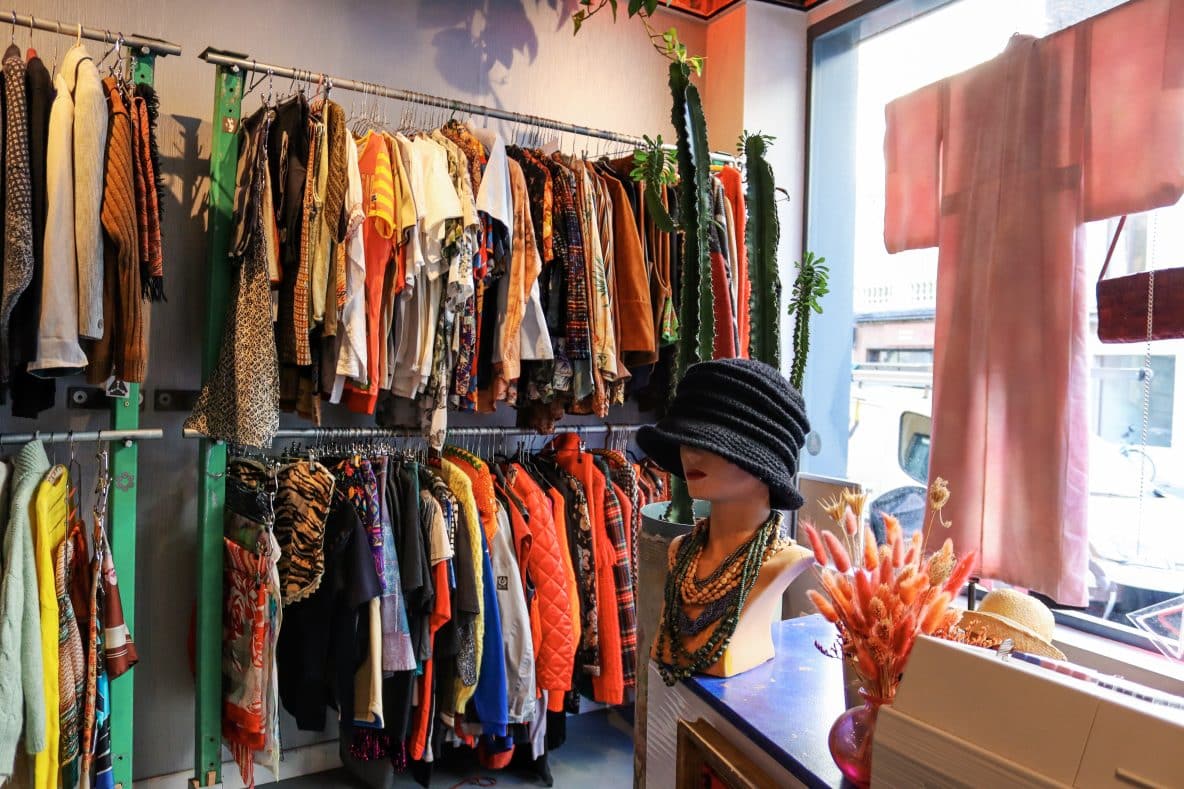Mathilde Smessaert (28) has collected clothes from all over Europe. The unique garments are put up for sale in her secondhand shop, Lost and Found. The shop has no gender, but it does have four personalities.
A peek inside the shop
Lost and Found can be found in the heart of Ghent at 257 Kortrijksepoortstraat, known as the street for vintage shops. When you walk into the secondhand shop, you immediately notice that all the garments are unique. The shop is small, with racks full of the craziest clothing items.
The fitting rooms stand out the most. The entrance has red plastic curtains that lead to the actual fitting rooms. You must first brave these to walk in. Because of those curtains, the fitting rooms have a red glow.
Mathilda also gives a lot of clothes a second “identity” or a new “look”. For example, she embroiders clothes that have a spot on them that can no longer be taken off. She also has a new collection of leather jackets onto which she has painted. This makes each piece of clothing even more unique.
Mathilda also does not want to focus on gender: she prefers gender neutrality. She doesn’t like putting people in boxes. The clothes she sells are for everyone. Mathilda focuses on four personalities: The Stranger, the Diplomat, the Darling, and the Firestarter. The Firestarter is a category for people who have a bold fashion sense and want to stand out. The Diplomats are go-getters and are not afraid to show leadership. The Sweetheart category is for those who want to be dressed more quietly. The Stranger likes to go through life a little more mysteriously. So, as you can tell, there is something for everyone.
Giving clothes a second life
Mathilde has always had a passion for vintage clothing. She worked very hard to turn her passion into a job.
The passion for vintage clothing came very naturally to Mathilde. She grew up in a big family, which meant they didn’t have money for expensive clothes from big shops. So, when she was younger, her mother would always take her to the vintage shops to buy her clothes. Her mother taught her that that was the way to have unique and iconic pieces that no one else from her friends could have. It made her original and alternative.
Mathilde has always been artsy; you could say it’s always been in her blood. She studied music at the Conservatorium in Ghent. She loved it because she could be very creative.
After studying music, she wanted to try out owning a vintage shop. All her friends knew her as a person who constantly wanted to style her friends in vintage clothes. As she had been making her own unique pieces for so long, Mathilde knew she was going to be able to do it.
She chose Ghent as the city to open her own shop. Ghent is known as an artsy student city, which was exactly what she was looking for. She knew her target audience would be in Ghent out of all cities.
Opening her own shop can still be a challenge to this day, but Mathilde says that when she gets overwhelmed and stressed, she thinks back to her youth and where it all began. Then the flow just comes back naturally.
Fien: our second reuse
Fien is a 21-year-old student who has been concerned about the environment ever since she was little. She is especially concerned about the waste in the fashion industry. Since she was 13, she has been buying her clothes exclusively in secondhand shops. Fien knows how to sew and alters the clothes she dislikes or doesn’t fit in. With the remaining fabric she makes bags. She uses those herself but also gives them to friends. Fien lived in a family with four children and there wasn’t a lot of money, so she was used to wearing secondhand clothes ever since she was little. She is the only one in her family who decided to take it that step further in her adult life, but they try to support her nonetheless. She started seeing the beauty of reusing everything while on holiday in Switzerland during a hike in nature.
Fien saw the beauty of the world and decided she wanted to help preserve it by consuming less. Her way of consuming less became reusing. She’s sometimes frustrated about the ignorance of other people. It can be hard when you feel like you’re being misunderstood and people don’t see the bigger picture. Fien often wondered why people kept buying clothes they didn’t need. But she seems optimistic about the future. More and more people go to secondhand shops, so she feels like people are getting more aware of the problem of overconsuming. You can listen to Fien talking about reusing in the podcast below.
Authors: Fleur Roose, Lisa Pyckavet, Ewart Van de Vyver, and Liselot Vande Weghe
[jetpack-related-posts]
